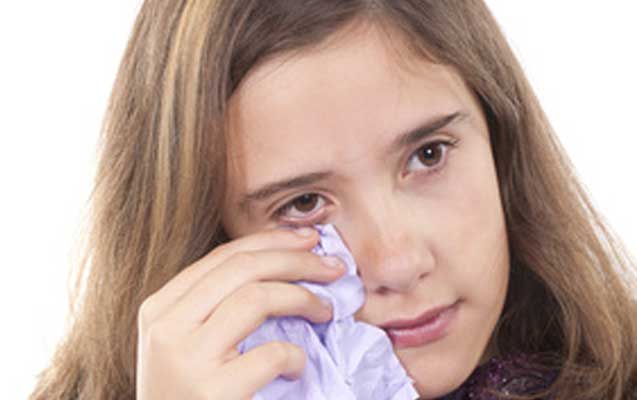Eye allergy
Eye allergies are caused by an overactive immune response to relatively harmless substances called allergens. Common allergens that cause eye allergies include pollen, dust, animal hair and pet dander. When these allergens come in contact with the surface of the eye, an allergic reaction occurs. This releases chemical mediators that cause the irritating symptoms associated with eye allergies.
Children’s eye allergies can cause itching, and your child may want to rub his or her eyes to find relief. Try to discourage this behavior. Rubbing causes the release of histamines that only make itching worse and cause redness of the eyes. It can even cause trauma to the surface of the eye and the eyelid and in some cases may induce change in the refractive status of the eye.
 What are the symptoms of eye allergy?
What are the symptoms of eye allergy?
Symptoms of ocular allergies may include itching, tearing, eyelid swelling, eye redness, and mucous discharge. After exposure to the allergen, the symptoms can develop rapidly. Attacks can be short-lived and episodic. In severe cases these attacks may be recurrent and last for several years before the child outgrows the problem.
What is the treatment for eye allergies?
The first step to treating ocular allergies is avoidance of the allergen if known. Many allergens, including animal dander and house dust mites, can be reduced by thoroughly cleaning carpets, bedding and linens. The severity of symptoms varies from person to person, so therapy should be tailored to each child’s symptoms. Some over the counter eye drops are harmful if used over a long period of time and may cause vision threatening complications like cataract and glaucoma. Parents should get children’s eye tested thoroughly every time they see the eyes becoming red. The medications prescribed by the doctor may have to be used for a long period of time in some severe cases.
How can I prevent eye allergy in my child?
- Stay indoors as much as possible when pollen counts are at their peak, usually during the mid-morning and early evening, and when wind is blowing pollens around. Avoid sending your children to playgrounds and garden especially in the springs and summers.
- Wear glasses or sunglasses when outdoors to minimize pollen or dust getting into your eyes.
- Avoid rubbing eyes, which will only irritate them or make your condition worse.
- Reduce dust mite exposure in your home, especially the bedroom. Bedding, particularly pillows, should be encased in “mite-proof” covers. Wash bedding often in hot water (at least 130*F). Keep humidity in your home low (between 30 percent and 50 percent).
- Clean floors with a damp rag or mop rather than dry dusting or sweeping.
- Wash your hands immediately after petting any animals. Remove and wash clothing after visiting friends with pets.
- Ask your children to wash their eyes frequently with cold water. This would wash away all the allergens from the eyes and would also reduce itchiness.


